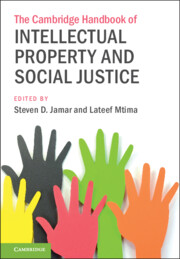Book contents
- The Cambridge Handbook of Intellectual Property and Social Justice
- The Cambridge Handbook of Intellectual Property and Social Justice
- Copyright page
- Dedication
- Contents
- About the Contributors
- Foreword
- Prolusion: What Is Intellectual Property (And Why Should You Care About It Anyway?) – A Layperson’s Guide to Intellectual Property Law
- Introduction: Intellectual Property Social Justice Theory: History, Development, and Description
- Part I IP Social Justice Foundations
- 1 Mapping the Intellectual Property/Social Justice Frontier
- 2 The Indians Who Were Not Heard and the Band That Must Not Be Named: Racial Formation and Social Justice in Intellectual Property Law
- 3 Intellectual Property Social Justice: A Theoretical Rationale
- Part II IP Social Justice in Major Intellectual Property Domains
- Part III IP Social Justice: Historical Perspectives
- Part IV IP Social Justice in the Political Economy: Engaging Activism; Achieving Change
- Part V IP Social Justice in the Information Age
- Part VI Intellectual Property Social Justice in Global Perspective: Issues in Gender and Development Disparity
- Part VII IP Social Justice: The Future of the Global IP Ecosystem
3 - Intellectual Property Social Justice: A Theoretical Rationale
from Part I - IP Social Justice Foundations
Published online by Cambridge University Press: 04 January 2024
- The Cambridge Handbook of Intellectual Property and Social Justice
- The Cambridge Handbook of Intellectual Property and Social Justice
- Copyright page
- Dedication
- Contents
- About the Contributors
- Foreword
- Prolusion: What Is Intellectual Property (And Why Should You Care About It Anyway?) – A Layperson’s Guide to Intellectual Property Law
- Introduction: Intellectual Property Social Justice Theory: History, Development, and Description
- Part I IP Social Justice Foundations
- 1 Mapping the Intellectual Property/Social Justice Frontier
- 2 The Indians Who Were Not Heard and the Band That Must Not Be Named: Racial Formation and Social Justice in Intellectual Property Law
- 3 Intellectual Property Social Justice: A Theoretical Rationale
- Part II IP Social Justice in Major Intellectual Property Domains
- Part III IP Social Justice: Historical Perspectives
- Part IV IP Social Justice in the Political Economy: Engaging Activism; Achieving Change
- Part V IP Social Justice in the Information Age
- Part VI Intellectual Property Social Justice in Global Perspective: Issues in Gender and Development Disparity
- Part VII IP Social Justice: The Future of the Global IP Ecosystem
Summary
Legal and other scholars offer and regularly debate a variety of theories of justification for intellectual property protection.2 After all, the intellectual property law helps to determine what kinds of intellectual property people produce and who has access to the products of intellectual property endeavors, including the knowledge and information contained in books and even the life-saving benefits of drugs and medicines.3 While lawmakers can weigh and balance competing societal needs and interests and then promulgate specific laws to achieve particular social objectives, it falls to judges to construe and implement those rules. In doing so, the judges, aided by legal scholarship, identify and articulate the principles, policies, and purposes that, together with the rules themselves, both statutory and common law, supply the bases and justifications for their interpretation and application of the law. Much the same as other legal regimes, and at times even more so given the nature of at least some types of works addressed by IP law, IP law must be shaped to accommodate technological advances and changing social conditions.
- Type
- Chapter
- Information
- Publisher: Cambridge University PressPrint publication year: 2024



